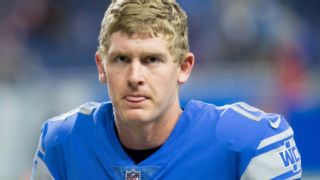|
Every Saturday, we take some of your questions for a Lions mailbag. To ask a question for a future mailbag, use the hashtag #LionsMailbag on Twitter or email me at michael.rothstein@espn.com. Now, on to your questions. JonJon, there are a few players I feel confident saying won’t get moved during the NFL draft: Matthew Stafford, Darius Slay, Taylor Decker, Ezekiel Ansah and Jarrad Davis. Other than that, it depends on what the offer is and what Detroit is trying to do. That said, there are players who would seem more likely to possibly get moved during the draft than others. The signing of Matt Cassel could mean Jake Rudock -- who had his name thrown around in trade discussions at various points -- could be a tradable player considering he is a restricted free agent after 2018. It would not surprise me if Detroit moved any of the running backs other than LeGarrette Blount. Of those backs, Ameer Abdullah and Theo Riddick would be the players to watch there for various reasons -- particularly if Detroit takes a running back early. Abdullah would probably be easier to move because he’s in the last year of his deal and his role on the team is a little less defined than, say, Blount or Riddick. The other player to potentially watch is Miles Killebrew. If Quandre Diggs stays at safety, Killebrew might be the fourth safety this year -- and Killebrew could fetch more in trade value than, say, a Stefan McClure or Charles Washington, two players who would likely then compete for the No. 4 safety job. If Detroit drafted a safety, that could also make Killebrew more expendable. This deal would again be more of a surprise than anything, but I could make a reasonable case for it. Ben, this is a good question. A lot of the mock drafts are trending toward a lineman of some sort, whether that’s a space-eating, run-stopping defensive tackle or an edge rusher who can play defensive end or stand-up outside linebacker. And those, frankly, are Detroit’s two biggest needs. For the purposes of this question, say Tremaine Edmunds, Vita Vea, Da'Ron Payne, Marcus Davenport, Taven Bryan and Harold Landry are all off the board at No. 20. The Lions could look at the offensive line or a middle/coverage linebacker (that’s a front-seven player, but I’m thinking more of the front when it comes to the 3-4 situation). This is also the type of scenario where a Derrius Guice could come into play as a first-round pick for Detroit if he’s the best option on the board. Here are two that are potentially a little different. If the Lions really feel comfortable in the best-player-available strategy, then a defensive back or tight end could be the choice. What players would those have to be? At tight end, probably Dallas Goedert or Hayden Hurst. Both could be stretches at No. 20, but if the Lions don’t like what else is there, it would fill a need and be a good player. Defensive back is more intriguing, particularly if cornerback Jaire Alexander or safety Justin Reid are around. Those are deep spots for Detroit, but Glover Quin is slowly heading to his mid-30s and at corner, DeShawn Shead signed a one-year deal and both Tavon Wilson and Nevin Lawson have real money guaranteed only in 2018. Those situations are not ones I would count on happening and I think if those were the best players on the board, the Lions would try to trade out of the spot. If they couldn’t, it could be possible. Raymond, there are advantages on both sides. From a team’s perspective, if you’re bringing in a free agent, a one-year deal allows you to cut ties pretty quickly if the player isn’t working out (and if he is and you choose to offer him a long-term deal, you know how he fits). From a player’s perspective, if you’re coming off an injury (like Shead, for instance) or if there are questions about you, a one-year prove-it deal could lead to bigger money on the market the following year. And don’t be fooled by some of the numbers thrown out there. Of the five players who signed multi-year deals with Detroit during free agency, none had fully guaranteed money after 2018. So in essence, the team can escape from those deals after this season with just a dead-money penalty if it wants. That’s always the number to really watch in contracts. So some of the deals offer security in a way because if a player plays well and the money isn’t too much in future years, he is likely to stick. But a one-year deal, in my opinion, can allow a player to cash in a bit better if they have a good year. Mark, I have no problem with it as long as it is productive. Most teams in the league use it and do so with varying levels of success. The only reasons to have a real problem with it are if it isn’t working (see the Lions last year, for instance) or if you’re a fantasy owner of one of those backs (see the New England Patriots pretty much any year). Otherwise, if it’s productive, that’s all that matters.
|

